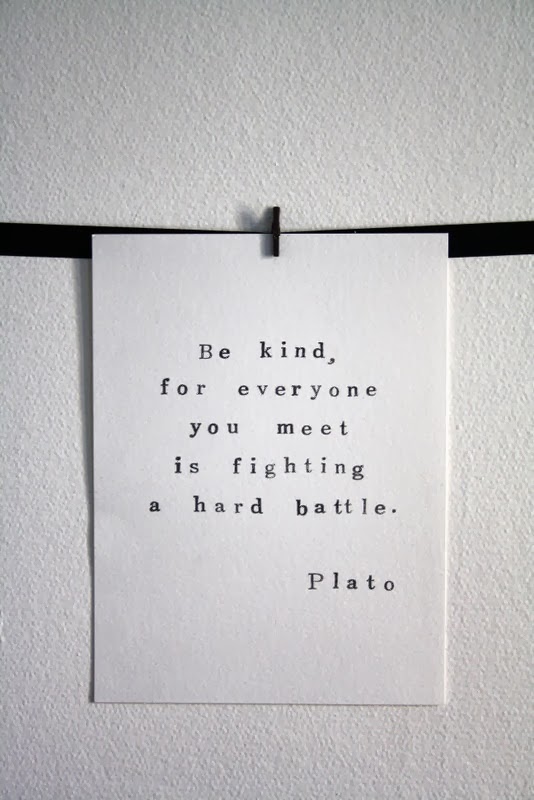
(Not actually Plato, but no matter; this is a good thing to remember.)
Q. What advice would you give someone on how to handle the mean-spirited comments people feel free to fling around [on the Internet]?
– Jeannine
A. You know, I answered this question in the comments under this post on new blogger advice, but thought about it overnight…and it deserves its own post. Because this is something that nearly everyone who puts their work onto the Internet will encounter in one form or another, sure (although god, did I ever not realize this back when I started, and god, was it ever a shock)…but more importantly, because it’s something that virtually everyone out there in the real world deals with, too. A woman who bangs into you on the street and calls you an idiot; a coworker who slams your work to your boss; an acquaintance who spreads lies about you for seemingly no good reason whatsoever.
We all deal with this kind of thing, and I know from experience that it’s an easy thing to handle poorly.
Look: the popular opinion, when it comes to Internet comments (and life, generally) is “ignore the haters.” Don’t reply to them, don’t interact with them, don’t argue with them, and definitely don’t write entire blog posts dedicated to how to deal with them, because all that does is stir them up (whoops). Sure, we can choose to look only at the bright side of the Internet, but that doesn’t mean that the other stuff isn’t there. It doesn’t mean the other stuff doesn’t matter. And it certainly doesn’t mean it doesn’t hurt.
The danger of the “ignore the haters” blanket statement is twofold: one, it makes you feel lame for admitting that these comments hurt…because aren’t we all supposed to be all awesome and bulletproof nowadays? I’ve been doing this for five years, and trust me, I’ve heard it all. And if you asked me about this a couple of years ago, I probably would have said “Oh, I just ignore that stuff; it doesn’t even bother me”…but that would have been – and still is – a lie I wanted to convince myself of. When someone writes hurtful things to me or about me, it hurts. Of course it does. And pretending it doesn’t only cuts off opportunities to reach out for support.
The second problem with the “ignore the haters” blanket statement: it presents the possibility that you’ll incorrectly brand anyone with a view counter to your own as a “hater,” and in doing so ignore statements that may be couched in negativity, but still have real value and the potential to inspire real conversation. And it’s my belief that allowing your ideas and life to be sheltered – protected on all sides from criticism – is the most dangerous thing of all.
Some comments, it’s true, come from a purely vicious place – and you know them when you see them; capital letters and curse words are usually involved. Ignore those. Period. Trying to engage with them is emotionally exhausting, disappointingly unproductive, and simply not a great use of your time.
But there are other comments that may appear hurtful, but also speak to a genuine desire to connect. And I’ve found that if I try to sift through those comments in search of what the person is actually trying to say, what I find is another human being whose voice matters, just like my (and your) own; their anger has just left them unable to speak as clearly as they’d probably like. Maybe they’re frustrated with their own job, or with their own relationship. Maybe they fundamentally disagree with a statement you made, and there’s an opportunity for dialogue and greater understanding on both sides. Or maybe they just want to be heard. Chances are that hateful statement is less about what you’re lacking, and more about something that the person who made it is searching for. This doesn’t mean that you should necessarily engage or write back – you’re under no obligation to do so – but sometimes searching for the true meaning behind all that negativity can teach you something. And beyond that: knowing what you’re really looking at can make being confronted with hatred less scary.
So here I am telling you that sometimes listening is good, but this is important, so it’s going in bold: Do not ever – ever – let your fear of “what people might say” stop you from speaking, or writing. You don’t have to pretend it doesn’t affect you – you’re only human – but you’re not allowed to let it silence you.
Those vicious statements can be hard to read when they land on your ears, in your inbox, or on your site. They can leave you spinning, questioning your own choices. But remember this: It’s a cliché – but a true one – that people who have hateful things to say are almost always reacting to something that’s going on in their own lives. So while you may be the target at that particular moment, that’s simply because you’re standing right there in front of them (albeit virtually). It’s not about you. It almost never is. Someone who expresses powerful anger towards a stranger – whether on the street or on the Internet – is probably hurting, and it is always, always important to show people compassion and respect even if they can’t show it back. Take the good that you can from the interaction and leave the rest, but don’t lash out at someone who is already in pain.
On the Internet, and in life: be kind. To others, and to yourself. Even – especially – when kindness seems in short supply. Things are better that way.




